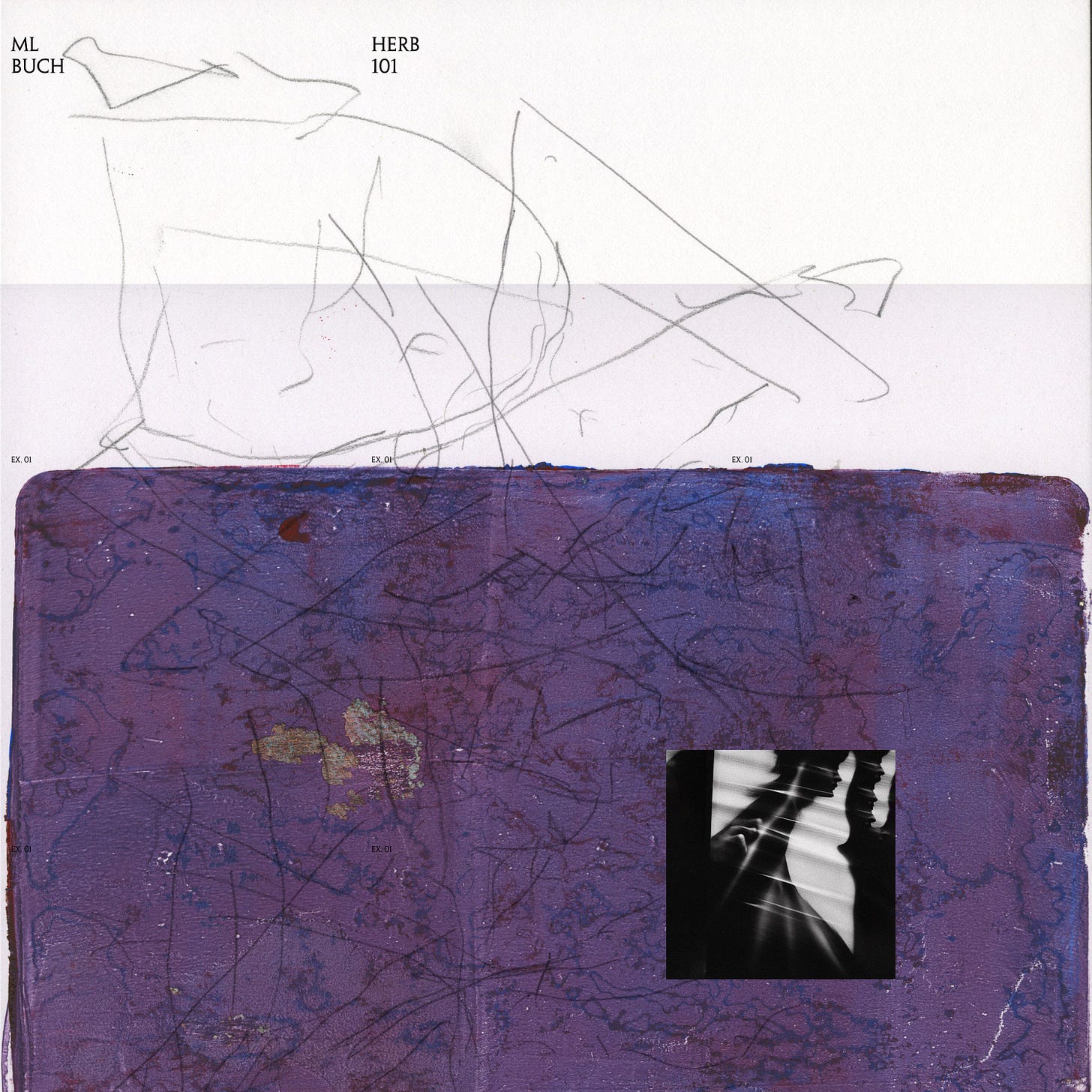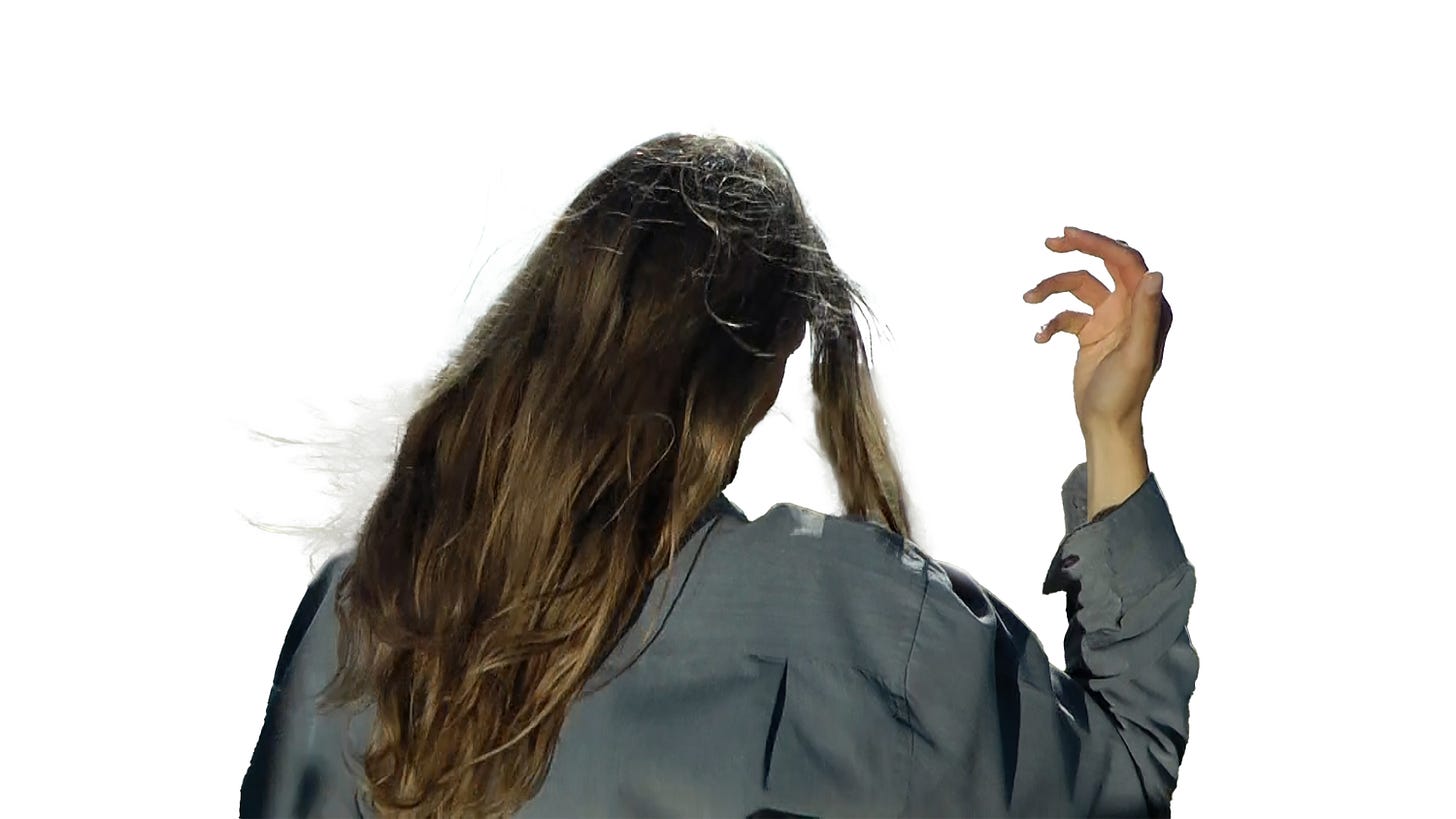Herb Sundays 101: ML Buch [Season 6 Finale]
Denmark's insurgent avant-pop hero, Marie Louise Buch, in core memory mode.
Herb Sundays 101: ML Buch (Apple, Spotify, Tidal, Amazon).
Art by Michael Cina
Editor’s note: This week, to close out the year and the season, I’m sharing another favorite musician with a great 2023 album. If you haven’t yet, check the Herb 100 archive site from which features a link to all Herb playlist entries plus unseen/unreleased art and more. Thanks for all the kindness this year. - sam

Here is a mix of some great songwriting, riffs and scores I love. When I was a kid I watched the same VHS tape with a Bo Diddley concert from Stockholm in 1980 over and over again and I still think it’s so good so we’re starting out with the tune.. “Bo Diddley”!
-ML Buch, Herb 101
I came apart
way up high
splattered on
the film of sky
warm sun
on my flapping face
sweeping for
a trail or a trace
Lyrics from Pan over the hill
They say it takes a few years for a decade to establish itself aesthetically. This one in particular needed more than a couple to lock in at all. While it’s true people generally have dressed and looked the same for the last 20 years, there are subtle characteristics we can point to that we are indeed in the era we belong to. ML Buch’s music is a great mile marker for the inevitable now.
Marie Louise Buch is a Copenhagen-based composer, producer, guitarist, and vocalist who collaborates often with other great artists like CTM (formerly of Choir of Young Believers). Following her debut EP Fleshy (2017), she released the acclaimed Skinned (2020) on Danish imprint Anyines, and her new album Suntub on the 15 Love label is making the rounds as one of the most striking albums of the year.
Those are the facts but it gets murky from there. Is she an Indie Rock artist? An Electronic artist? An arch Experimental composer surfing an AI-stalked present via her brand of spectral, iridescent Pop? Probably all of the above.
But what does she sound like? I was relieved that Boomkat, my Chicago Manual of Style, picked up on the same thing as I for Suntub, or the Joni Mitchell Hejira (1976) of it all. But in another breath, it could just be Fourth World Ambient music drunk on the Dewey Decimal’d corpus of AM Gold.
I also keep coming back to calling the sound a piece of hold music for the future (we are still waiting…), spun off from a dot matrix printer paper scroll of Tim Carleton’s “Opus 1” which must rank amongst the most listened-to Electronic music of the age. A YouTube commenter reminds us: “This song is fire. That is why I always leave the customers on hold for at least 15 minutes, so they can enjoy its beauty.” Or is it the sound of Clip Art coming to life, the inner life soundtrack for the people in stock photography, what a “metaverse” could have sounded like haded been if Scandinavian, or what you’d get training an AI on the theme from Forensic Files and asking for a commercial ditty.
Back to hold music, the music of the future never came to pass they say. We may have stalled out just shy of the millennium with Drum & Bass/IDM which got swept up in and then discarded by Pop and Rock or “crunk/trunk” signatures which dominate everything, which is why maybe Y2K aesthetics with their ‘60s/’80s level of optimism work well right now. We never got the Jetson’s glide-thru closet, and the backyard space adventures of Explorers are now privatized, so there is no chance I or any of my readers will be going there.
Mark Fisher’s work, particularly Ghosts of My Life: Writings on Depression, Hauntology and Lost Futures (2014) weighs heavy on our age:
“While 20th-century experimental culture was seized by a recombinatorial delirium, which made it feel as if newness was infinitely available, the 21st century is oppressed by a crushing sense of finitude and exhaustion. It doesn’t feel like the future. Or, alternatively, it doesn’t feel as if the 21st century has started yet. We remain trapped in the 20th century.
The slow cancellation of the future has been accompanied by a deflation of expectations. There can be few who believe that in the coming year a record as great as, say, the Stooges’ ‘Funhouse’ or Sly Stone’s ‘There’s a Riot Goin’ On’ will be released. Still less do we expect the kind of ruptures brought about by The Beatles or disco. The feeling of belatedness, of living after the gold rush, is as omnipresent as it is disavowed.”
Buch’s work, especially Suntub reminds me that there is pleasure to be had, and love to be made, it’s just weirder than before to center oneself. An album of almost corporate calm, like Steve Roach’s best work, it hits you differently with each listen and in each location but still doesn’t unearth its core mystery. The album bio suggests things like “props like puddles, well buckets, bone barrels and flesh rags live in these scenes, suspended in air, drifting about, climbing stairs and ladders, all given life through guitar sensibilities and visceral vocals.” Great, I have no idea what that means, but all the better for it.
, who has a scary good Substack sort of nails it, the romantic aloneness of it all:ALBUM OF THE YEAR: ML Buch, SUNTUB
Allow the Danish musician ML Buch to drive home the significance of setting the perfect mood, via the liner notes for her latest album, Suntub: “Vocals recorded in cars along the Danish coastlines / Guitars recorded in various houses and waterfront storage spaces / Reamped through a Peugeot SUV and in Kalundborg swimming pool, sauna and changing room.” Which goes a long way in explaining how, the first time I listened to Suntub, I’d been caught in a November rainstorm on the beach near where I live, where the lifeguard stands had blown over and the dune grass was taller than me.
I caught on to ML Buch just after her debut album Skinned made waves in 2020. Listening again, it’s lovely how much of a template the album laid (after a great EP to be fair), it’s like AOR grafted onto a dysfunctional T2 exoskeleton, or as Miles Bowe wrote for Pitchfork:
From its dramatic first synth splash, Mary Louise Buch’s debut album, Skinned, seems as uncanny as an android. Its disorienting first minutes shift between sleek sonic touchstones—sci-fi keyboards, synthesized baroque strings, echoing drum crashes, and a warped, robotic vocal—with mechanical ease. But then we get a true shock: Delicately fingerpicked guitar clears the air for a soft human voice.
The Rising piece from that same year by Jazz Monroe is the most illuminating look into Buch’s psyche so will just encourage you to read it instead of paraphrasing it but it also charts a path into her Herb Sundays entry:
“When I was about 5, my father played me a VHS tape with a Bo Diddley concert from Stockholm in the ’80s. I remember [Diddley bandmate] Lady Bo—her real name was Peggy Jones—standing there in her Stars and Stripes bikini top and this mean-looking synthesizer guitar. That was the first woman I saw play guitar. But the bands at school were boy kind of bands. Being a girl was not the coolest thing.”
Listening closer to her mix, you can hear the DNA of her sound, which also has a deeply American thread, maybe more akin to artists like MJ Lenderman (Herb 46) in its riff-focus positioned against the wide-screen cinemascope of her friend Malibu (Herb 82). But you also hear the aching sprawl of Mica Levi or Morton Feldman, and yes, the warped spiritual-glamor of the Herb throwback album of the year, Ray Of Light. What better digital sludge to evolve from, recombined and renewed, finally looking like a future we can see ourselves in.






